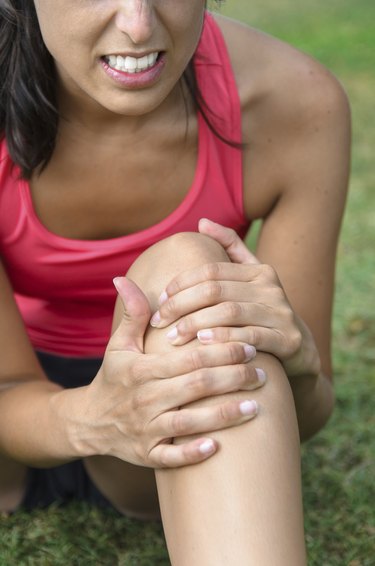
Premenstrual tension is one of the symptoms of premenstrual syndrome that generally occurs just before a woman's period. While the specific causes of PMS are still largely unknown, resources such as the Women to Women website suggest that it involves an imbalance between the levels of your estrogen and progesterone hormones. Talk to your doctor if your sore knee condition continues after you have your period.
Definition
Video of the Day
According to studies reported in the British Medical Journal, premenstrual tension can manifest in a wide variety of symptoms, such as severe headaches, palpable edema of the face and hands, weight gain, asthma, joint and muscle pain, stiffness of the hands and bloating. All symptoms were found to dissipate with the onset of each woman's periods but tended to recur at varying times throughout the end of the menstrual flow. Women who experienced irregular or delayed menses often experienced worsened symptoms of premenstrual tension. Sore knees, along with lumbar pain and other joint-related symptoms, are a common occurrence for women who have PMS.
Video of the Day
The Connection
The Women's Health website lists several factors that contribute to PMS, including hormonal changes, stress, depression, emotional problems and chemical changes in the brain. Unfortunately, since each woman experiences a different number and intensity of individual symptoms, the relationship between these factors and the body's reactions remain unknown. As a result, it is possible that one woman's sore knee symptoms could be caused by swelling of the joints, while another's is caused by inflamed muscles around the sciatic nerve. If your knee pain doesn't seem to decrease after your menstrual cycle, it is possible that it may have a secondary source, such as arthritis, tendinitis or an injury.
What to Do
The Women to Women website recommends a number of treatment options for reducing your PMS symptoms, including good nutrition, dietary supplements and progesterone therapy. Although more evidence is required, it is possible that nonorganic dairy products such as butter, milk and cheese may contain residual livestock growth hormones that may interact with your natural hormone cycle. As a result, it may be best to opt for organic dairy sources or avoid dairy altogether until your symptoms improve. Since bloating and fluid retention can aggravate knee pain, eating salty foods should be discouraged during this time.
Safety Concerns
Talk to your doctor if your sore knee symptoms persist after you finish your period. According to MedlinePlus, other causes of knee pain include baker's cysts, bursitis, lupus, joint infection, iliotibial band syndrome, kneecap dislocation, injury, Osgood-Schlatter disease, meniscus tearing, strain and torn ligaments.